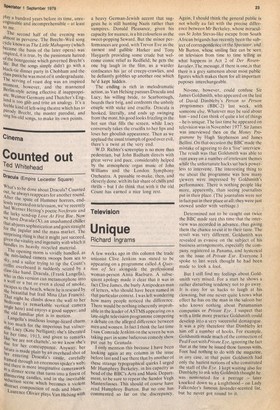Television
Unique
Richard Ingrams
A few weeks ago in this column the trade unionist Clive Jenkins was stated to be appearing on a programme called A Question of Sex alongside the professional woman-person Anna Raeburn. A subsequent apology made it clear that it was in fact Clive James, the burly Antipodean man of letters, who should have been named in that particular context. I was left wondering how many people noticed the difference. There would be nothing inherently improbable in the leader of ASTMS appearing on a late-night television programme compering a debate on the alleged difference between men and women. In fact I think the last time I saw Comrade Jenkins on the screen he was taking part in some ludicrous comedy show put out by Granada. I only mention this because I have been looking again at my column in the issue before last and I see there that by another of these strange typographical quirks I urged Mr Humphrey Berkeley, in his capacity as head of the BBC's Arts and Music Department, to be sure to repeat the Sandor Vegh Masterclasses. This should of course have read Humphrey Burton. But no one has commented so far on the discrepancy. Again, 1 should think the general public is not wholly au fait with the precise difference between Mr Berkeley, whose miraculous St John Stevas-like escape from South African brigands has recently been the subject of correspondence in the Spectator, and Mr Burton, whose smiling face can be seen on television from time to time telling us what happens in Act 2 of Der Rosenfravalier.The message, if there is one,is that there is a grey sameness about most public figures which makes them for all important puposes interchangeable.
No-one, however, could confuse Sir James Goldsmith, who appeared on the last of David Dimbleby's Person to Person programmes (BBC-2) last week, with someone else. Whatever may be said about him — and I can think of quite a lot of things — he is unique. The last time he appeared on television was in November 1977. Sir James was interviewed then on the Money Programme by Hugh Stephenson and James Bellini. On that occasion the BBC made the mistake of agreeing to do a 'live' interview. The result was that Goldsmith was able to rant away on a number of irrelevant themes while the unfortunate hacks sat back powerless to intervene. The interesting thing to me about the programme was how many yiewers were impressed by Goldsmith's performance. There is nothing people like more, apparently, than seeing journalists put in their place. (The journalists were not in fact put in their place at all; they were just snowed under with verbiage.) Determined not to be caught out twice the BBC made sure this time that the interview was recorded in advance, thus giving them the chance to cut it to their taste. The result was very different. Goldsmith was revealed as evasive on the subject of his business arrangements, especially the company registered in Panama, and hysterical on the issue of Private Eye. Everyone I spoke to last week thought he had been made to look a fool.
But I still find my feelings about Goldsmith very mixed. For a start he shows a rather disturbing tendency not to go away. It is easy for us hacks to laugh at his clowning, but one never quite knows what effect he has on the man in the saloon bar who knows nothing about Panamanian companies or Private Eye. I suspect that with a little more practice Goldsmith could develop into a very successful demagogue. It was a pity therefore that Dimbleby let him off a number of hooks. For example, Goldsmith made much of the connection of Paul Foot with Private Eye, ignoring the fact that at the time he issued those famous writs, Foot had nothing to do with the magazine, in any case, at that point Goldsmith had only the haziest notions of who constituted the staff of the Eye. I kept waiting also for Dimbleby to ask why Goldmith thought he was nominated for a peerage — later knocked down to a knighthood — on Lady Falkender's famous lavender-scented list, but he never got round to it.






























 Previous page
Previous page